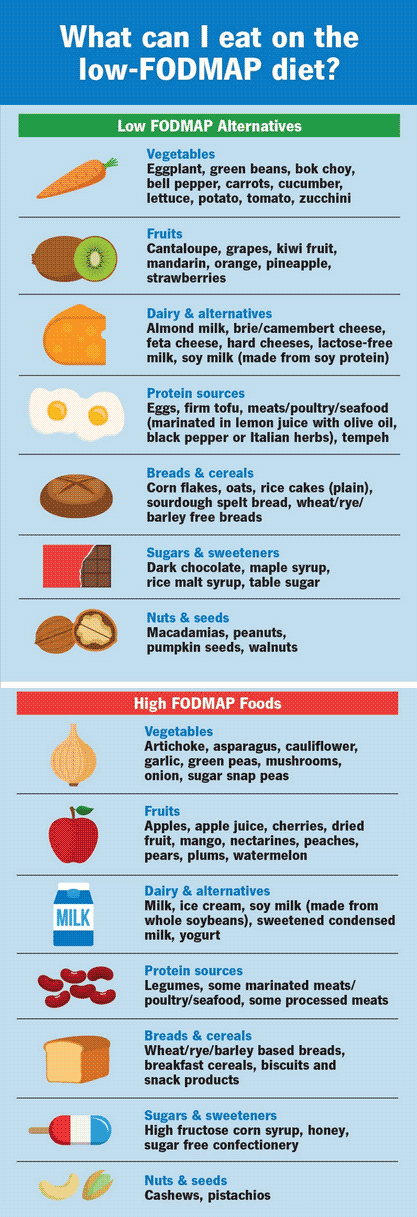Last Updated on June 5, 2022 by Dr.Derek Fhisher
FODMAP stands for:
F: Fermentable
O: Oligosaccharides
For example fructans (components of rice, rye, barley, onion, garlic and a few fruits, veg and almonds) and galacto-oligosaccharides (GOS) (the different parts of pulses and a few nuts and veg).
D: Disaccharides
In this wording, this means lactose (dairy glucose), found in milk products.
M: Monosaccharides
In this wording, this means fructose (berry glucose), found primarily in berry and processed food items for example cookies and muffins.
A: And
P: Polyols
These arise normally in veg and some berry and are also used as synthetic sweeteners.
Some individuals don’t unable to endure them, although these are carbs that happen naturally in food.
Some individuals may be sensitive to a certain food group in the FODMAP diet. For instance, lactose-intolerance and fructose intolerance are possible sensitivities. In order to make sure the food list provided is appropriate, if you have a specific sensitivity, you should consult a registered dietitian familiar with the FODMAP diet.
Those afflicted have difficulty absorbing them from your small intestine For reasons authorities do not fully understand,’ affirms HFG specialist and dietitian Minimal. ‘ Therefore The sugars transfer to the large bowel, where stomach microorganisms ferment them, making gasoline that creates distension , bloating and breeze. This might also spark reflexes that both speed the bowel (leading to free, vital chairs) or gradual it (leading to constipation).
How to handle it:
1. If these sugars bother your digestive tract,
you should reduce your intake of ingredients high in FODMAP. This can have a significant effect on your bloating, but you should follow a diet with minimal FODMAP for many days before you discover the results.
2. You should see a nutritionist who is familiar with low-calorie diets
if you speculate that you may be prone to the FODMAP diet. An experienced dietitian can walk you through an elimination diet – so it needs professional supervision to ensure it is done correctly and all the vitamins you need for good health.
3. Most people don’t have a problem with all the FODMAPs that exist;
you shouldn’t be insensitive to some of them. This is very important to note because the reduction is stringent – FODMAPs carve out many balanced food groups, such as high-fiber meals, which are still necessary for good gut health. This is why it’s important to get expert advice – you need to make sure you’re not following an overly restrictive diet.
When to consult a registered dietitian
For the most part, you should stick to the food list provided by the FODMAP Diet. If you feel as if the food list is not right for you or your child, consult a registered dietitian.
A registered dietitian will conduct a history and physical exam to identify the cause of your gastrointestinal symptoms and how they relate to your diet. The dietitian will also work with you to create a plan. It will take time to implement any diet. When you begin the FODMAP diet, you will experience symptoms that can be both troubling and painful. It’s not recommended that you follow the FODMAP diet for more than one month at a time.
Food sensitivity testing
Food sensitivity testing is available but is only for patients who have already been diagnosed with celiac disease or inflammatory bowel disease. Foods that do not trigger symptoms in patients with celiac disease may still trigger symptoms in those with IBD or another condition. If you have a condition known to be triggered by certain foods or you have severe gastrointestinal symptoms, consult a registered dietitian before starting a gluten-free diet. A dietitian can help you identify which foods need to be removed from your diet and then help you decide if a testing is appropriate.
The low FODMAP diet
Many people who are diagnosed with irritable bowel syndrome or a food sensitivity to certain foods find that they tolerate the FODMAP diet, a special diet used to treat those who have irritable bowel syndrome or other GI issues that respond to elimination and reintroduction of particular foods. The low FODMAP diet is similar to the standard FODMAP diet.
The low FODMAP diet works by removing specific high-FODMAP foods from your diet for a period of time. This may be done under the supervision of a doctor or a registered dietitian. Many people have success on this diet, particularly in the treatment of IBS. The low FODMAP diet is a strict diet that should be followed for at least 3 to 6 months to determine its effectiveness in treating symptoms. If you feel that your symptoms are improving on the low FODMAP diet, you should maintain the diet for at least 2 years, or as long as symptoms persist, to ensure your success with the diet.
Many foods in the FODMAP diet are found in the low FODMAP diet. The low FODMAP diet removes some high-FODMAP foods, including sugar-free and fat-free products that may be higher in sugar or fat and refined starches, such as wheat flour, and also removes other high-FODMAP foods. Some low-FODMAP foods that may be included in the diet are listed below.






No Comments Yet